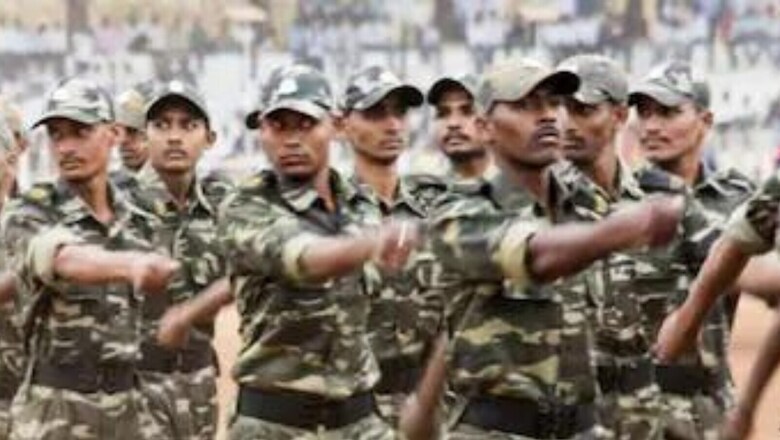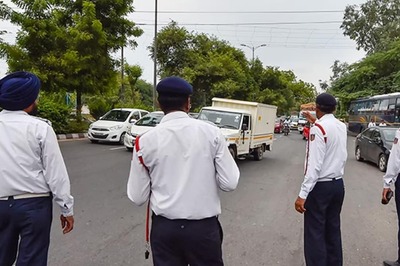
views
The Government of India launched its new scheme of recruitment in the defence forces popularly known as the Agnipath scheme and recruits joining the defence forces, as part of this scheme, are being called Agniveers, a notch below the current day sepoys as stated by the government in a court of law. The scheme, having been announced on 14 June 2022, has been analysed threadbare by various stakeholders including those from the veteran community. Though the announcement, which initiated the process of recruitment after a gap of two years in the defence forces, halted the ongoing process abruptly, even in the cases where it had reached near finality, it also opened a new challenge for the recruitment of Gorkha soldiers from Nepal besides affecting Indian citizens.
With the passage of time, the dust is reasonably settled and recruitment rallies have been conducted at multiple locations in the country by all three services which are continuing on a regular basis. Not only this, the new entrants are arriving at various designated training centres slowly but steadily as per the progress of the recruitment process. Since there are a number of vacancies of Gorkha soldiers from Nepal, these were also planned to be filled albeit as per terms and conditions of the Agnipath scheme. The recruitment rallies were planned at designated locations in Nepal but the Nepal government did not agree for such rallies to be conducted. Though the Opposition got somewhat voiced about the temporary nature of the recruitment, it was highlighted that a policy decision will be taken after the new government is formed in Nepal as elections were then due in Nov 2022.
Gorkha soldiers were part of the British Indian Army at the time India achieved independence on 15 August 1947. There were 10 regiments out of which six remained part of the Indian Army whereas four regiments became part of the British Army. This was done as part of the Britain-India-Nepal tripartite agreement. The terms and conditions applied only to Gorkhas serving in the Indian Army and British Army. These terms did not apply to Gorkhas who were part of the Nepalese Army.
The terms and conditions necessitated the preservation of the national identity of these soldiers, respecting their religious and cultural faith and paying allowances at par with the soldiers of India and Britain. India has respected these terms and conditions to the minutest details and has integrated Gorkha soldiers as part of their Army without any difference whatsoever. It has also extended pensions and other welfare measures including healthcare, whether the soldier has settled in India or Nepal. Gorkha soldiers have also displayed the highest degree of values and commitment as part of the Indian Army whether going to war is concerned or any other task entrusted to them. They are seen with great respect by the countrymen that they have earned.
Given such integration, the continuation of Gorkha troops in the Indian Army is critical. It not only provides excellent soldiers to India but also works towards an enhanced bilateral relationship between India and Nepal. This becomes more important at a time when China has started making inroads in Nepalese affairs in a big way whether in the form of infrastructure development or creating a rift between India and Nepal on various counts. Indian and Nepalese governments should not let it happen for the larger good of both nations.
Now that the new government has been formed in Nepal with Pushpa Kamal Dahal, also known as Prachanda, it will shape the national policies in days to come including the direction of the bilateral relationship with India. One of the policies will include accepting the Agnipath scheme as a new model of recruitment. India is principally right to extend the same terms and conditions to Nepalese citizens for recruitment, as has been done for Indian citizens without any caste, creed, or religious and regional considerations. The current prime minister of Nepal, having been part of Maoist ideology, has to be much more sensitive before a decision is taken in this regard. The following aspects are important:
- Agnipath scheme is under judicial examination. The court may not intervene, being a policy decision of the government. At best, the courts may give some relief to those who had progressed to some stage of recruitment based on previous advertisements. As per the direction of the Supreme Court, Delhi High Court is examining all the cases and a decision in this regard is expected this month. The court will decide the issue based on the merits of the case. Whether the outcome is final or challenged again in the Supreme Court will be known later. If the scheme is stuck down, the challenges in front of the Nepalese government will vanish but in case the scheme is upheld as correct legally, the Nepal government will have to take a call.
- In case the scheme is accepted in the current form as is the case for Indian citizens, the problem may surface along with the challenges for absorption of those Agniveers who did not get retained after four years of service. This challenge is being attempted to be addressed to some extent in India, by offering preferences in the employment in Central Para Military Force (CPMF), state police forces and other armed organisations. Some corporates are also coming forward for offering job opportunities to these non-retained Agniveers. Such options to the extent required may not exist in Nepal, given the nature of the country being landlocked and the economy not so strong. It will be, therefore, prudent that India sees the Agniveers who are not retained with a similar telescope as is the case with Indian Agniveers. Once a dialogue takes place on this format, the current Nepalese government may find it easier to be part of the process.
- In case the Nepalese government insists only on a permanent absorption model, that may pose a fresh challenge for India. On one hand, there is rising demand that all the vacancies should be given only to Indian citizens, given the current state of unemployment in the country, and on the other hand, if preferential treatment is given to Gorkhas, it may result in more opposition within the country. If the Nepalese government agrees only to a permanent model, a mid-way could be found wherein the vacancies for Nepal be reduced to 25 percent and a permanent absorption model can be adopted. This may be acceptable to the Indian population as well, though the exact outcome will be known later.
- It is very important for India to keep Nepal as its trusted partner as the Chinese are making huge ingress in Nepal which may result in the Nepalese border also being guarded by regular troops which will raise the security cost to the country astronomically high.
It is, therefore, very important that a channel of communication with the new Government of Nepal be opened and the issue of recruitment of Gorkha soldiers into the Indian Army is resolved on priority on the similar norms as applicable to Indian citizens. Unless suitable positive overtures are made, the issue may result in affecting the bilateral relationship adversely. India needs to handle this Nepalese conundrum carefully in its national interest.
The writer is a retired Army veteran. Views expressed are personal.
Read all the Latest Opinions here




















Comments
0 comment